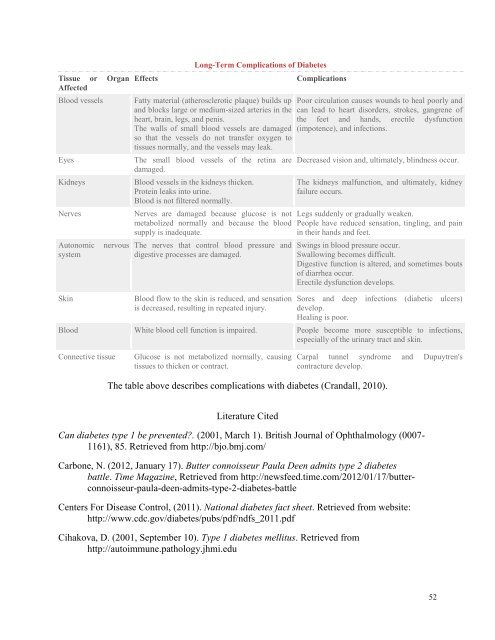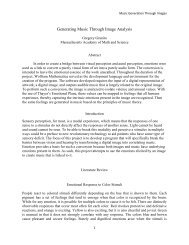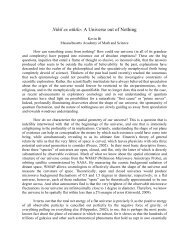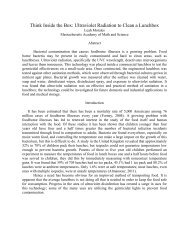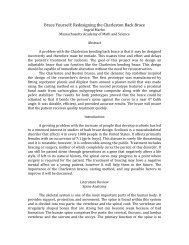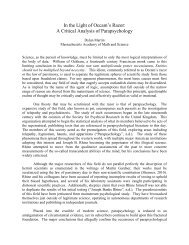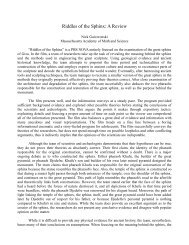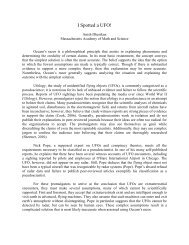Got Food? - the Scientia Review
Got Food? - the Scientia Review
Got Food? - the Scientia Review
You also want an ePaper? Increase the reach of your titles
YUMPU automatically turns print PDFs into web optimized ePapers that Google loves.
Tissue or Organ<br />
Affected<br />
Blood vessels<br />
Eyes<br />
Kidneys<br />
Nerves<br />
Autonomic<br />
system<br />
Skin<br />
nervous<br />
Effects<br />
Long-Term Complications of Diabetes<br />
Fatty material (a<strong>the</strong>rosclerotic plaque) builds up<br />
and blocks large or medium-sized arteries in <strong>the</strong><br />
heart, brain, legs, and penis.<br />
The walls of small blood vessels are damaged<br />
so that <strong>the</strong> vessels do not transfer oxygen to<br />
tissues normally, and <strong>the</strong> vessels may leak.<br />
The small blood vessels of <strong>the</strong> retina are<br />
damaged.<br />
Blood vessels in <strong>the</strong> kidneys thicken.<br />
Protein leaks into urine.<br />
Blood is not filtered normally.<br />
Nerves are damaged because glucose is not<br />
metabolized normally and because <strong>the</strong> blood<br />
supply is inadequate.<br />
The nerves that control blood pressure and<br />
digestive processes are damaged.<br />
Blood flow to <strong>the</strong> skin is reduced, and sensation<br />
is decreased, resulting in repeated injury.<br />
Complications<br />
Poor circulation causes wounds to heal poorly and<br />
can lead to heart disorders, strokes, gangrene of<br />
<strong>the</strong> feet and hands, erectile dysfunction<br />
(impotence), and infections.<br />
Decreased vision and, ultimately, blindness occur.<br />
The kidneys malfunction, and ultimately, kidney<br />
failure occurs.<br />
Legs suddenly or gradually weaken.<br />
People have reduced sensation, tingling, and pain<br />
in <strong>the</strong>ir hands and feet.<br />
Swings in blood pressure occur.<br />
Swallowing becomes difficult.<br />
Digestive function is altered, and sometimes bouts<br />
of diarrhea occur.<br />
Erectile dysfunction develops.<br />
Sores and deep infections (diabetic ulcers)<br />
develop.<br />
Healing is poor.<br />
Blood White blood cell function is impaired. People become more susceptible to infections,<br />
especially of <strong>the</strong> urinary tract and skin.<br />
Connective tissue<br />
Glucose is not metabolized normally, causing<br />
tissues to thicken or contract.<br />
Carpal tunnel syndrome and Dupuytren's<br />
contracture develop.<br />
The table above describes complications with diabetes (Crandall, 2010).<br />
Literature Cited<br />
Can diabetes type 1 be prevented?. (2001, March 1). British Journal of Ophthalmology (0007-<br />
1161), 85. Retrieved from http://bjo.bmj.com/<br />
Carbone, N. (2012, January 17). Butter connoisseur Paula Deen admits type 2 diabetes<br />
battle. Time Magazine, Retrieved from http://newsfeed.time.com/2012/01/17/butterconnoisseur-paula-deen-admits-type-2-diabetes-battle<br />
Centers For Disease Control, (2011). National diabetes fact sheet. Retrieved from website:<br />
http://www.cdc.gov/diabetes/pubs/pdf/ndfs_2011.pdf<br />
Cihakova, D. (2001, September 10). Type 1 diabetes mellitus. Retrieved from<br />
http://autoimmune.pathology.jhmi.edu<br />
52


